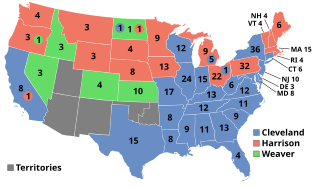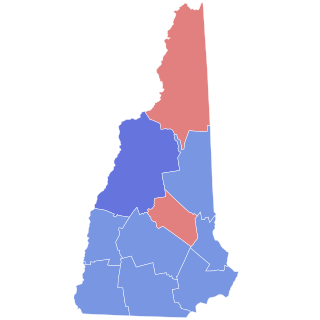
Presidential elections were held in the United States on November 8, 1892. In the fourth rematch in American history, the Democratic nominee, former president Grover Cleveland, defeated the incumbent Republican President Benjamin Harrison. Cleveland's victory made him the first president in American history to be elected to a non-consecutive second term, a feat not repeated until Donald Trump was elected in 2024. The 1892 election saw the incumbent White House party defeated in three consecutive elections, which did not occur again until 2024.

The 1978 United States Senate elections were held on November 7, in the middle of Democratic President Jimmy Carter's term. The 33 seats of Class 2 were contested in regular elections. Special elections were also held to fill vacancies.

The 1974 United States Senate elections were held on November 5, with the 34 seats of Class 3 contested in regular elections. They occurred in the wake of the Watergate scandal, Richard M. Nixon's resignation from the presidency, and Gerald Ford's subsequent pardon of Nixon. Economic issues, specifically inflation and stagnation, were also a factor that contributed to Republican losses. As an immediate result of the November 1974 elections, Democrats made a net gain of three seats from the Republicans, as they defeated Republican incumbents in Colorado and Kentucky and picked up open seats in Florida and Vermont, while Republicans won the open seat in Nevada. Following the elections, at the beginning of the 94th U.S. Congress, the Democratic caucus controlled 60 seats, and the Republican caucus controlled 38 seats.

The 1968 United States Senate elections were elections for the United States Senate. Held on November 5, the 34 seats of Class 3 were contested in regular elections. They coincided with the presidential election of the same year. The Republicans picked up five net seats in the Senate. This saw Republicans win a Senate seat in Florida for the first time since Reconstruction.

The 1966 United States Senate elections were elections on November 8, 1966, for the United States Senate which occurred midway through the second term of President Lyndon B. Johnson. The 33 seats of Class 2 were contested in regular elections. Special elections were also held to fill vacancies. With divisions in the Democratic base over the Vietnam War, and with the traditional mid-term advantage of the party not holding the presidency, the Republicans took three Democratic seats, thereby breaking Democrats' 2/3rds supermajority. Despite Republican gains, the balance remained overwhelmingly in favor of the Democrats, who retained a 64–36 majority. Democrats were further reduced to 63–37, following the death of Robert F. Kennedy in June 1968.

The 1954 United States Senate elections was a midterm election in the first term of Dwight D. Eisenhower's presidency. The 32 Senate seats of Class 2 were contested in regular elections, and six special elections were held to fill vacancies. Eisenhower's Republican party lost a net of two seats to the Democratic opposition. This small change was just enough to give Democrats control of the chamber with the help of the Independent who at the start of this Congress in January 1955 agreed to caucus with them; he later officially joined the party in April 1955.

The 1952 United States Senate elections was an election for the United States Senate which coincided with the election of Dwight D. Eisenhower to the presidency by a large margin. The 32 Senate seats of Class 1 were contested in regular elections, and three special elections were held to fill vacancies. The Republicans took control of the Senate by managing to make a net gain of two seats. However, Wayne Morse (R-OR) became an independent forcing Republicans to rely on Vice President Richard Nixon's tie-breaking vote, although Republicans maintained a 48–47–1 plurality. Wayne Morse would caucus with the Republicans at the start of Congress’ second session on January 6, 1954 to allow the GOP to remain in control of the Senate. This was the third time, as well as second consecutive, in which a sitting Senate leader lost his seat.
The Massachusetts Republican Party (MassGOP) is the Massachusetts branch of the U.S. Republican Party.
The 1884 Democratic National Convention was held July 8–11, 1884 and chose Governor Grover Cleveland of New York their presidential nominee with the former Governor Thomas A. Hendricks of Indiana as the vice presidential nominee.

Electoral history of Wayne Morse, United States Senator from Oregon, candidate for the 1960 Democratic presidential nomination and Oregon favorite-son candidate in the 1952 Republican presidential primaries.

The 1968 United States Senate election in Oregon was held on November 5, 1968. Incumbent Democratic U.S. Senator Wayne Morse was seeking a fifth term, but narrowly lost re-election to 36 year-old Republican State Representative Bob Packwood in a very close race.

The 1986 United States Senate election in California took place on November 4, 1986. Incumbent Democratic U.S. Senator Alan Cranston narrowly won re-election to a fourth and final term over Republican U.S. Congressman Ed Zschau. This was the last time where both major party nominees for the Class 3 Senate seat in California were men until 2022.

The 1892 Missouri gubernatorial election was held on November 8, 1892 and resulted in a victory for the Democratic nominee, former Congressman William J. Stone, over the Republican candidate former Congressman William Warner, Populist candidate Leverett Leonard, and Prohibition candidate John Sobieski.

The 1968 United States Senate election in Alabama took place on November 5, 1968. Incumbent Democratic U.S. Senator J. Lister Hill retired. He was succeeded by Lieutenant Governor of Alabama James Allen, who won a hotly contested primary over Armistead I. Selden Jr. In the general election, Allen easily defeated Republican Probate Judge Perry O. Hooper Sr. and National Democratic nominee Robert Schwenn.

The 1972 United States Senate election in Oregon took place on November 7, 1972. Incumbent Republican Senator Mark Hatfield was re-elected to a second term in office, defeating Democrat Wayne Morse.

The 1930 Massachusetts gubernatorial election was held on November 4, 1930.

The 1894 Michigan gubernatorial election was held on November 6, 1894. Incumbent Republican John T. Rich defeated Democratic candidate Spencer O. Fisher with 56.89% of the vote.

The 2022 United States Senate election in New Hampshire was held on November 8, 2022, to elect a member of the United States Senate to represent the State of New Hampshire. The primary elections were held on September 13, 2022. Incumbent Senator Maggie Hassan was re-elected over Republican retired brigadier general Don Bolduc by an unexpectedly large margin of 9.1% that surpassed most polls. Hassan won her initial bid for this seat in 2016 by only 1,017 votes or 0.14%. This election marked the first time a Democrat won re-election to New Hampshire's class 3 Senate seat.

The 1892 Tennessee gubernatorial election was held on November 8, 1892. Democratic nominee Peter Turney defeated Republican nominee George W. Winstead, and Incumbent Governor John P. Buchanan, who ran as a Populist, with 47.86% of the vote.

The 1892 Idaho gubernatorial election was held on November 8, 1892.





















